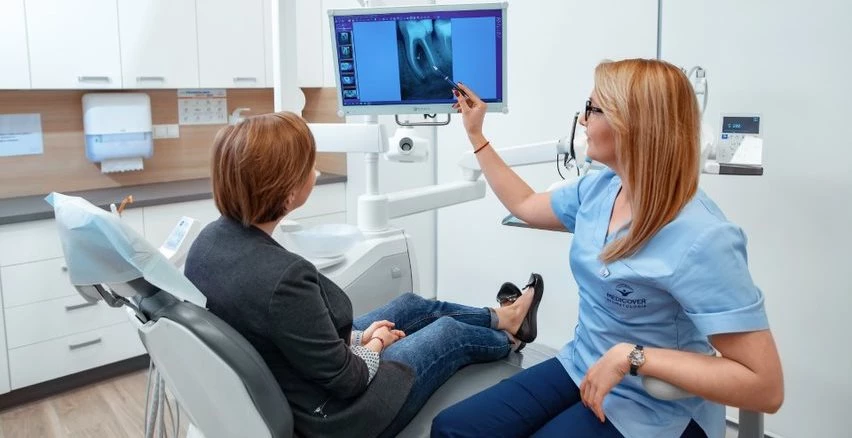
The first dental visit can cause a lot of stress to patients. This is absolutely pointless! We are usually afraid of new and unknown things. It is worth to learn more about the course of a dental visit. When from the beginning the patient knows what to expect at the dental office during the first contact with the dentist, she or he is less nervous and is able to achieve a better level of cooperation with the dentist.
What should we remember before the visit?
In order to improve the course of the visit and not to miss any important medical information, patients should be well prepared to meet the doctor.
Despite the fact that the dentist cares mainly for the prevention and oral health, it should not be forgotten that the teeth and gums may affect other organs and systems. It is important that the dentist learns more about the patient's medical history. In some specific conditions, certain procedures may be impossible to perform (or should be postponed). The easiest way is to present the medical documentation that is received at consultations with other specialists or at the hospital. Special attention should be paid to:
- infective endocarditis (IE),
- inflammation of the mouth,
- pregnancy,
- gastroesophageal reflux disease (GERD),
- thrombosis.
Chronic diseases are associated with taking medications permanently – and the patient should inform the doctor about them. This is important because some preparations may affect wound healing or prolong bleeding. The patient should take a piece of paper and make a list of all medications that are permanently taken (if needed) or bring packages of these medications.
The history of dental treatment seems to be important, too. Reading the documentation will help the doctor to learn more about the patient's profile.
If any additional dental procedures were previously conducted, it is worth taking their results to the first dental visit to the new office. This mainly applies to pantomogram (dental X-ray) or occlusal photography, which has changed over a certain period of time.
What do the dental check-ups look like?
For a well-prepared patient, the first dental visit is not complicated. After registration, the patient receives a form with questions related to the general health condition. Upon completing it, the patient is directed to the right office. The doctor reads the documents in an office and adds further questions to the health survey. In order to make a full diagnosis, the dental examination is needed, and a written informed consent should be obtained in advance.
If the patient does not have a pantomographic image, it will be taken at the first visit.
At the end of the visit, the patient receives a treatment plan that defines the treatment needs. The plan also specifies a treatment cost estimate and the planned order of the procedures. If necessary, the patient is directed to other specialists such as an implantologist, prosthetist, periodontist or dental surgeon. The dentist presents oral hygiene instructions, describes the problems that have been identified and points to possible treatment methods. The date of the next visit is set. The dentist answers all questions and then walks the patient back to the reception. There, the next appointment is being scheduled, and the payments is made.
Expertise and professionalism are the values that the Medicover team cultivates diligently. We know it very well that small gestures such as shaking hands to greet or say goodbye relieve tension and strengthen the doctor-patient relationship. Explaining the character of the procedure, dismissing doubts and presenting costs in a simple, understandable language is the basis for good cooperation.

What should we ask the dentist?
When faced with the question "What would you like to ask about?", the patients often stay silent. However, we should remember that in order for the treatment process to run smoothly, the patients should clarify all their doubts.
If the patient does not understand or does not agree with the given recommendation, it is worth asking the doctor for clarification. It is also good to ask about other recommendations, especially if they are not mentioned on the card, but their impact on the treatment process may be significant.
Prevention is key for oral health. If the patient has some issues with routine dental check-ups and brushing or flossing techniques, more detailed questions should be asked about these procedures.
If some treatment method does not suit the patient, there is no reason why not to ask questions about any alternative procedure. It is also worth to make sure which types of treatment are actually necessary and which ones are only optional.
